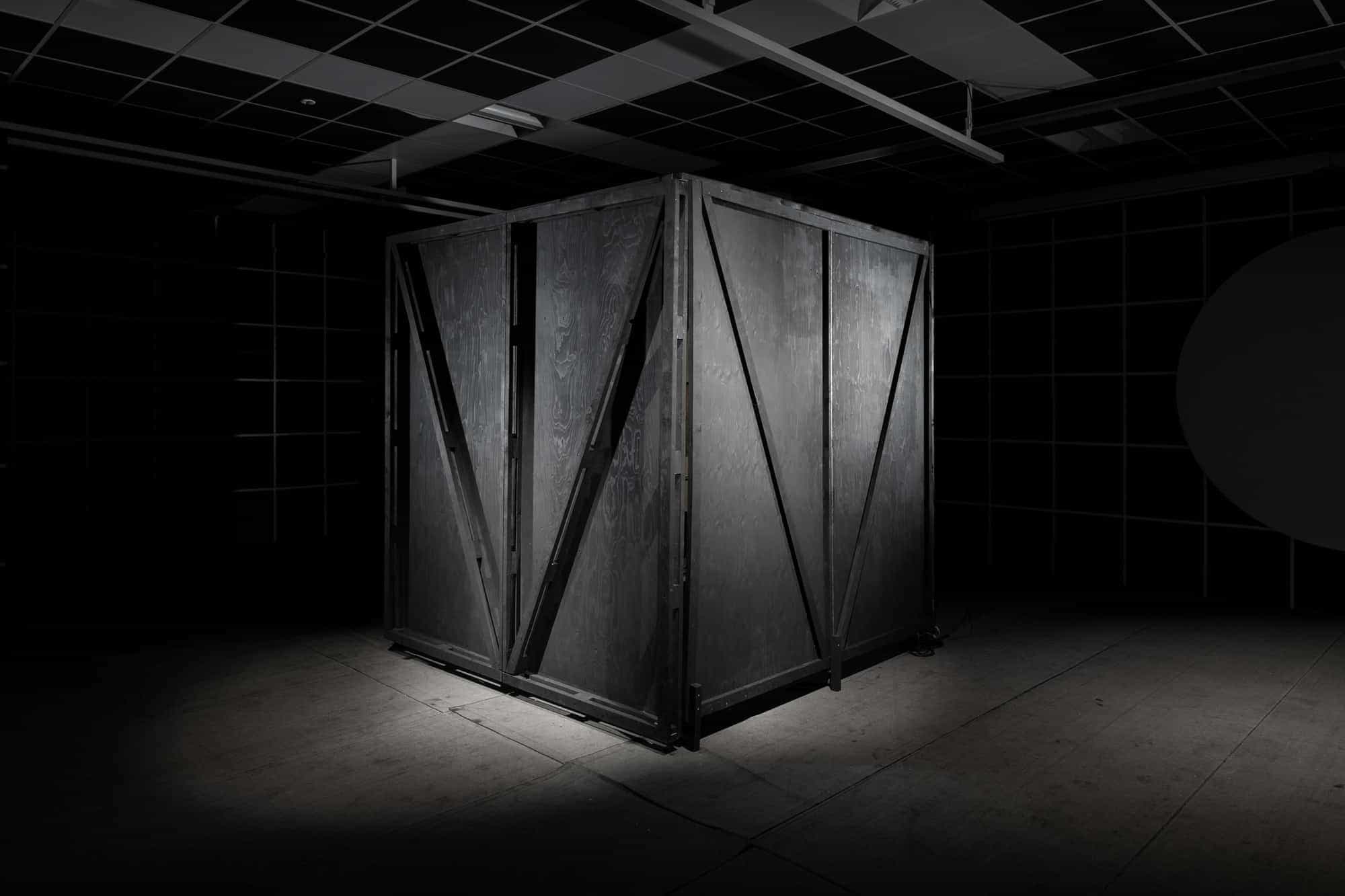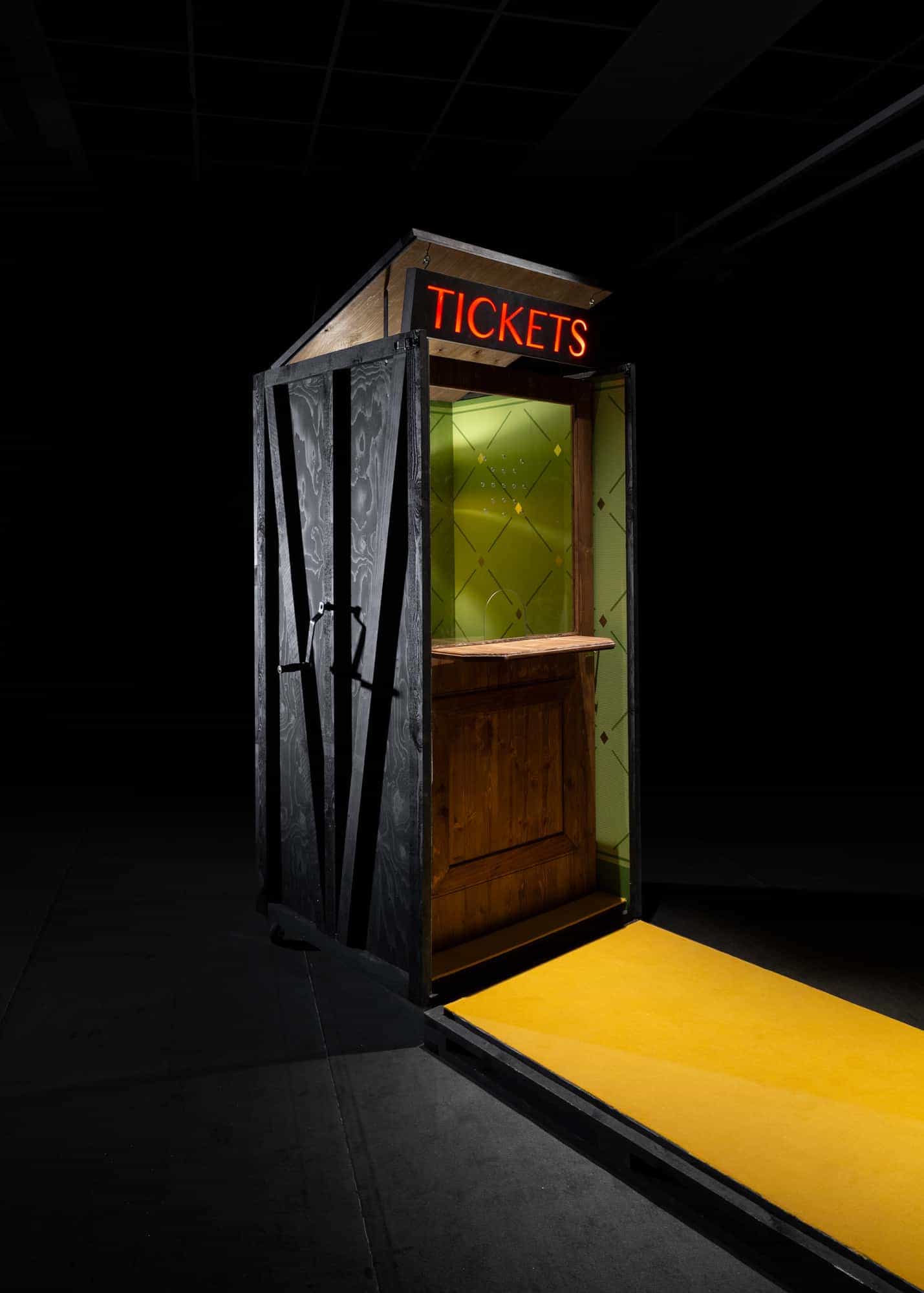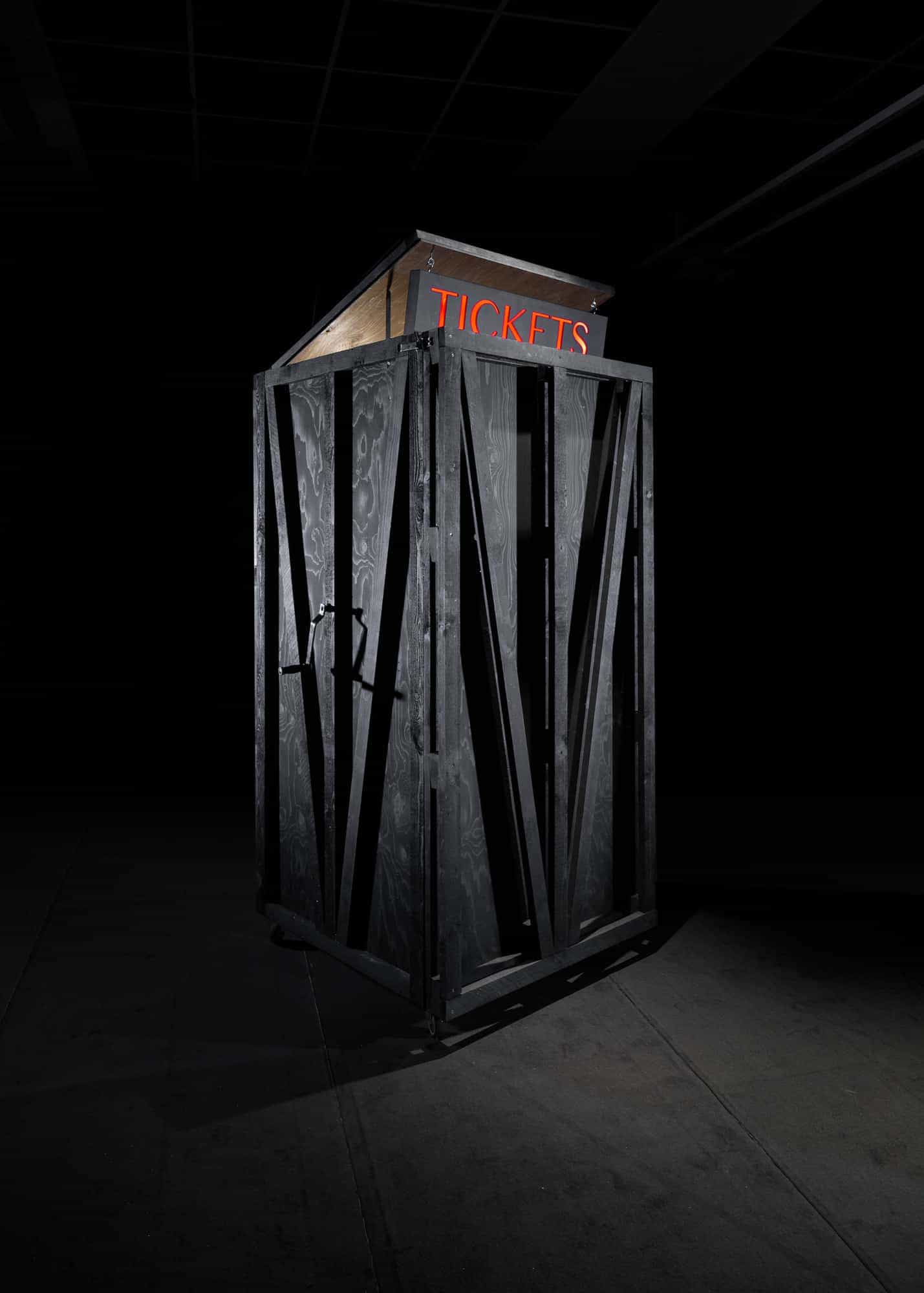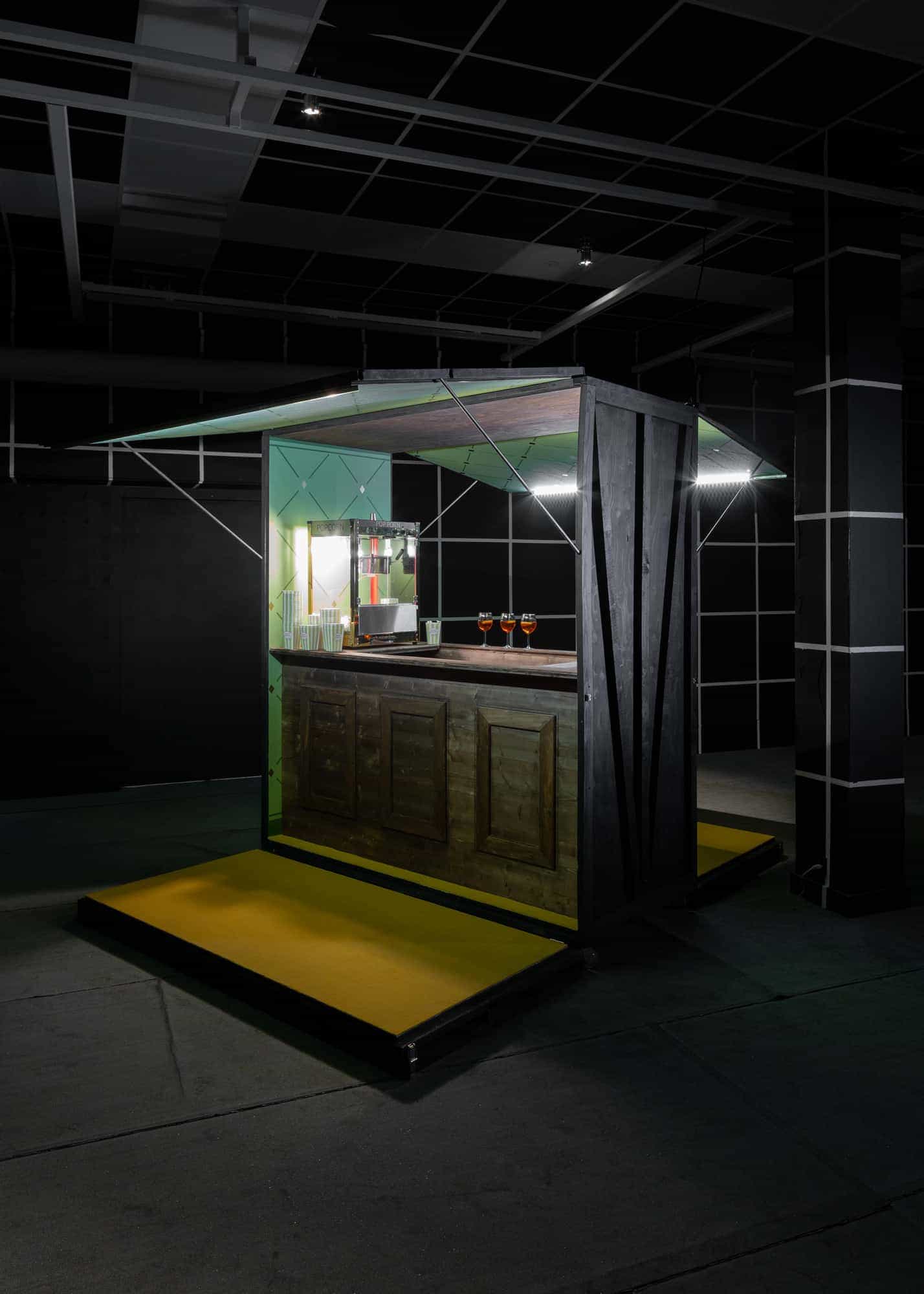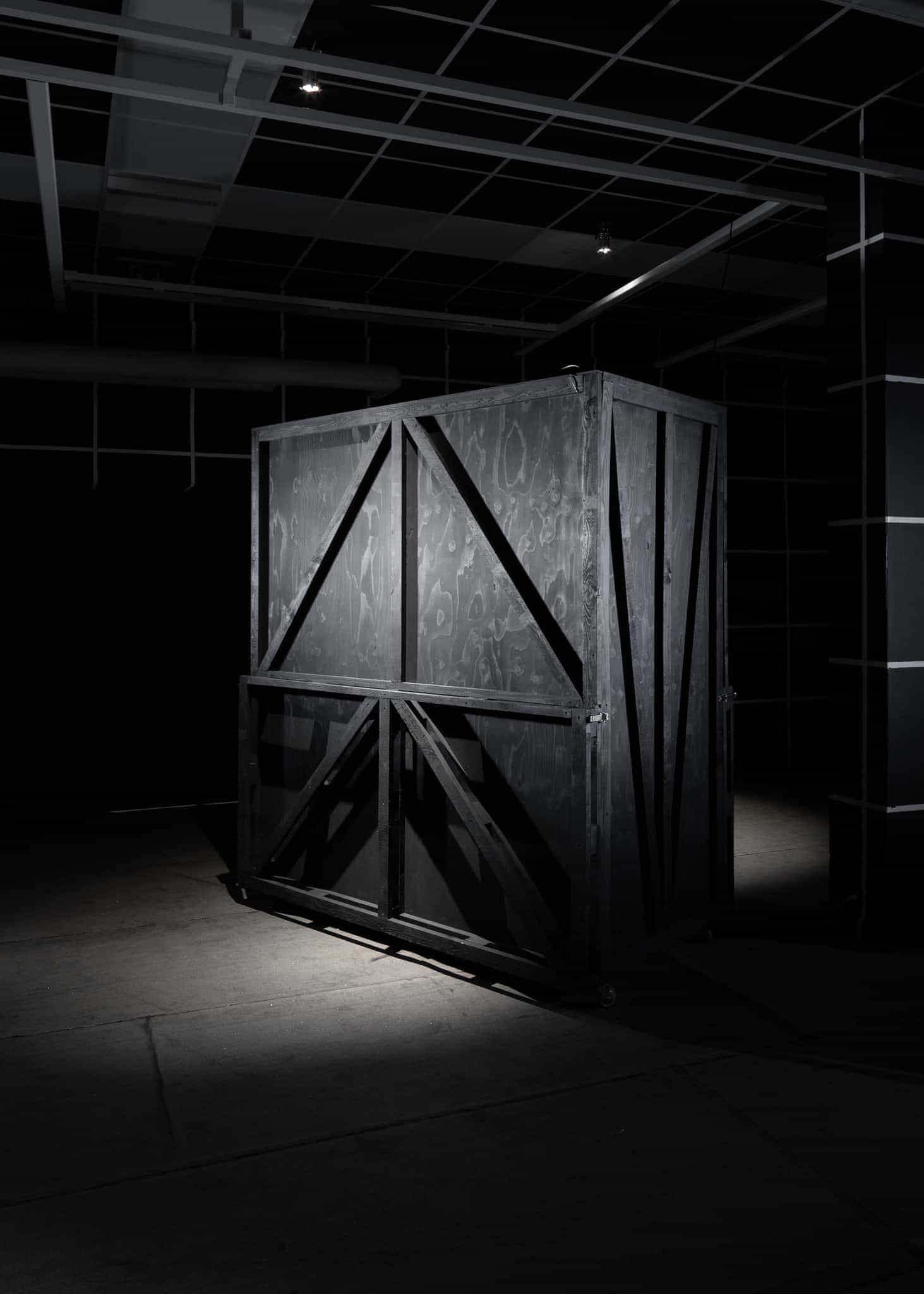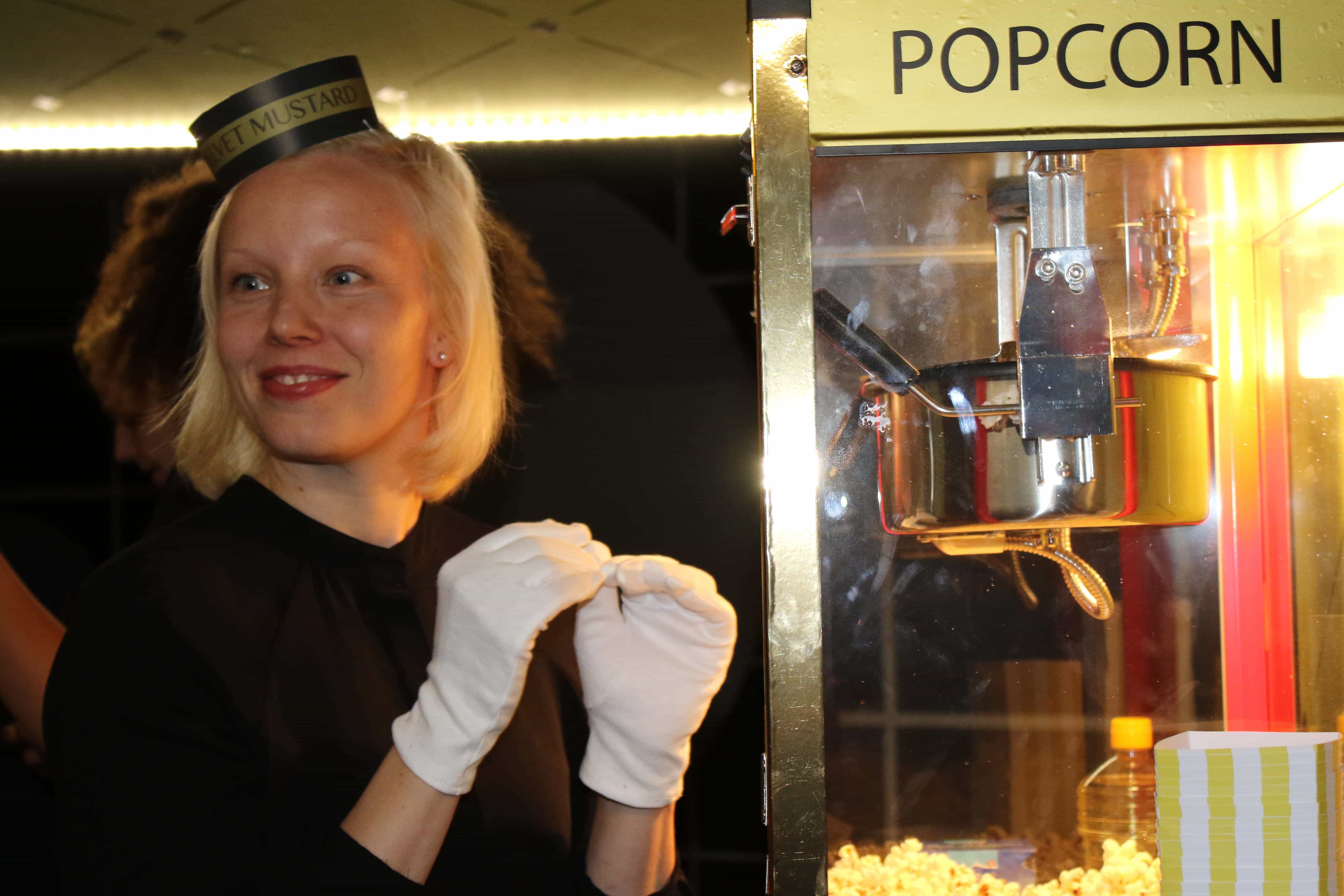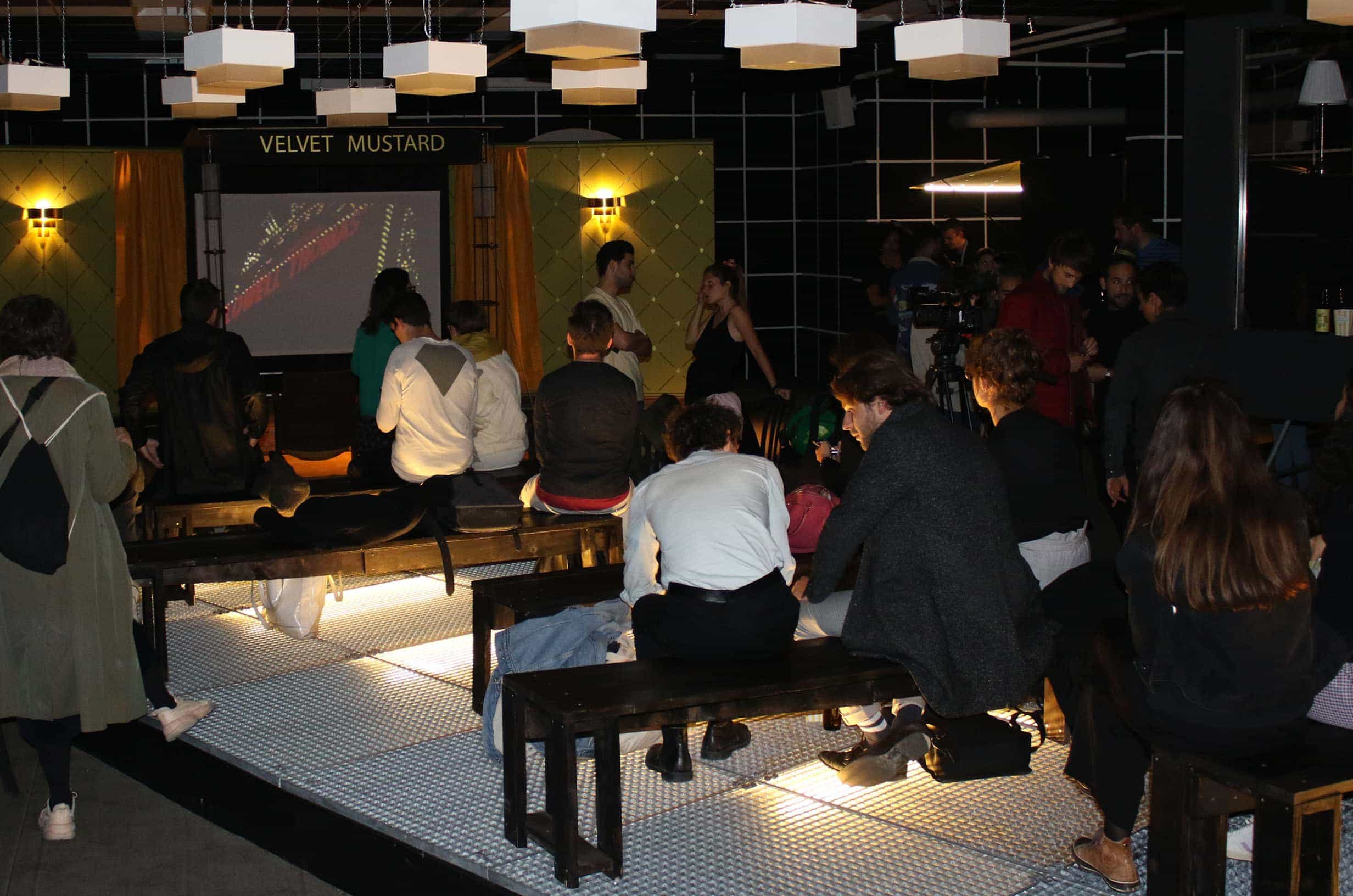A cinema installation, followed by a conversation between Matthieu Bareyre and Youri Kravtchenko
12.05.2019, F’AR Lausanne
NIGHT FILM belongs to a series of events from the project SCÈNES DE NUIT, that presents five nocturnal encounters exploring the role of night in the construction of contemporary cities and societies. The exhibition seeks to examine and reflect upon the spaces, activities and media unfolded in night culture, and uses evening events and ephemeral scenography as the main display platform. The scenography was developed by students of HEAD-Genève’s Bachelor in Interior Architecture
What makes cinema an extraordinary place is its ability to isolate itself from day or night, to have no temporality. Cinema is like a box, a mise en abyme, a world within a world. Cinema is also a moment, more or less short, that transports us through images and takes us on a journey. Cinema is a Sunday evening activity. Sunday evening is watching a movie lying on the couch. Sunday evening is watching a movie to forget about Monday's return.
Curators: Javier F. Contreras, Youri Kravtchenko
Assistant: Manon Portera
Students: Shana Bennett, Elisa Cuddré-Mauroux, Nemo Reitz, Nora Rhyner
HEAD–Genève Interior Architecture Department
Photos: © Audrey Besanseney, HEAD – Genève, Baptiste Coulon

A conversation between Matthieu Bareyre and Youri Kravtchenko
Matthieu Bareyre, filmmaker, and Youri Kravtchenko, architect and scenographer, discuss the concept of night in his film L’Époque. Night is a space-time that tends to push people to open up more. At night, we dare to say things that we wouldn't during the day, according to the director. Space-time is, in the Youri Kravtchenko, what gathers and links the night with the cinema space, cinema projections, and finally, architecture.
Youri Kravtchenko It's tempting to ask you a lot of questions. But I will just ask you about how the film originated, for those who don't know. It's a movie you started four years ago, right? It's primarily shot at night.
Matthieu Bareyre Yes, I had the idea for the film in January 2015 at the time of the Charlie Hebdo attacks. At that time, I had the idea for the title, the project itself, and other elements like the music. And I started shooting it in May 2015. I finished shooting in June 2017. The editing of the last version – because, in fact, there are two versions, a royalty-free festival version and the commercial version, it's two completely different edits, two completely different lengths – the editing of the commercial version was completed in February. And the film was released in April in France. So, it has indeed been four years.
Youri Kravtchenko In the end, does it get tiring working at night?
Matthieu Bareyre Yes, yes, the state in which I've been is a state of exhaustion... With all that comes with it, a sense of irritability, of tetchiness. Yeah, I think it made me highly sensitive to a lot of things, both the good and the bad. Because inevitably, and you will see, the film is made in rather tricky situations. The street, night clubs, wild demonstrations, it can get pretty violent. So, it's true that it exacerbates the feelings you may experience. Well, it needed to come out at that moment of my life, I think it corresponded well to the story of what I was doing at that age of life, and which is my own youth. Yes, it was also full of downsides, well, I'm a migraine sufferer, so it was hell. Actually, migraine sufferers are not allowed to sleep late. They do not have the right to have late, lazy mornings because it causes migraines. So needless to say, there I was.
Youri Kravtchenko Oh, that was not... too much suffering?
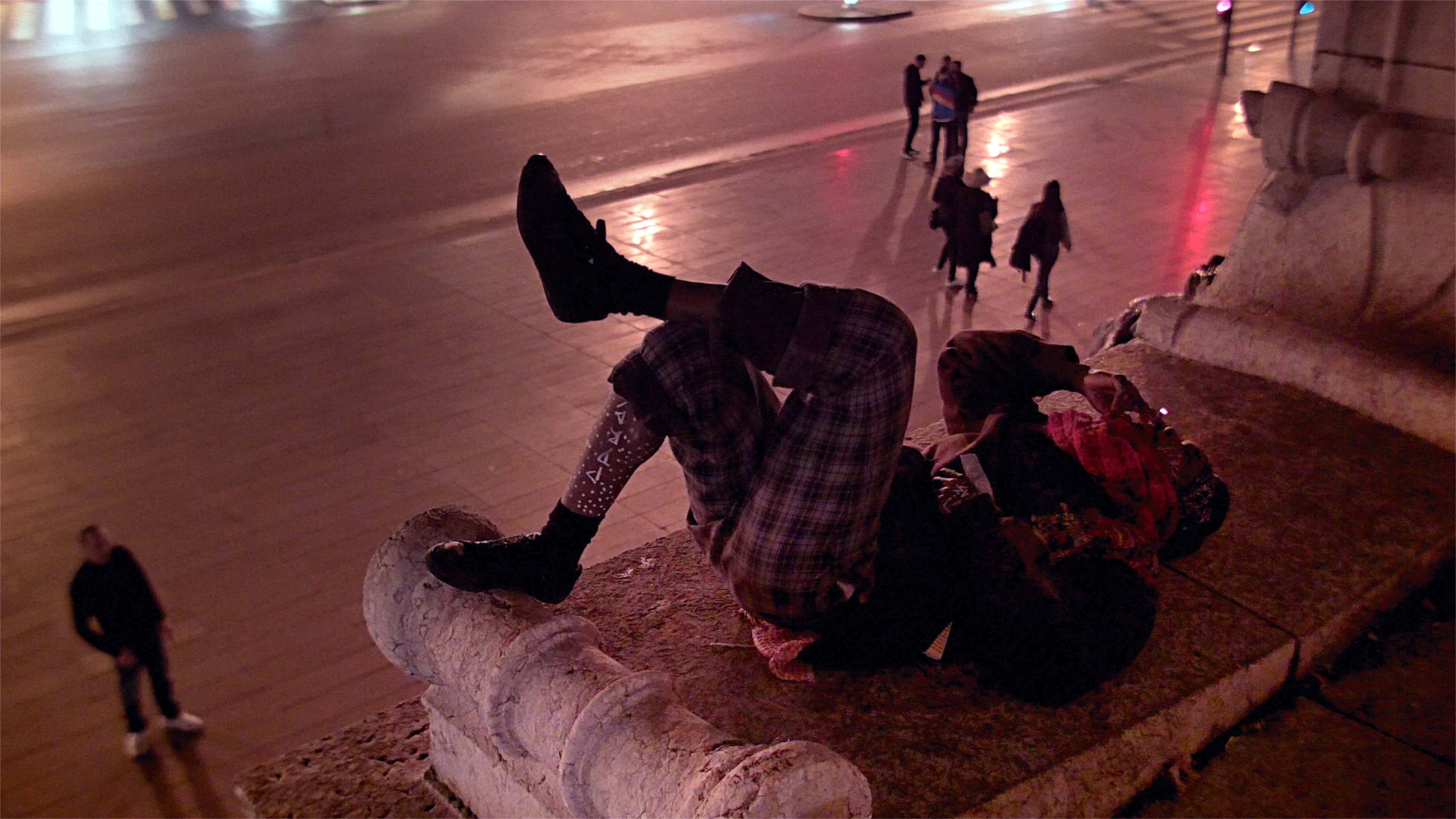
Matthieu Bareyre Yeah, but at the same time, there was something more significant. There’s not just suffering, of course, there's also, I was going to say enjoyment, but how to say, it's actually a kind of exhaltation. Permanent exhaltation. Of course, it is the feeling I have when I remember those moments, whether it is filming or editing, it is a kind of a permanent alternation between exhaustion and the joy of overcoming it, of succeeding in overcoming the exhaustion. Voila!
Youri Kravtchenko We'll save the questions for after the screening. L'Époque (in English it would probably be “Our times”), I find it a very fitting title, concise, it really represents a specific unit of time and place, as we were talking about earlier. It's happening there, Place de la République, you'II see for yourself.
So, this allows me to come back to the first film. It's the film by Alain Tanner and Claude Goretta, local filmmakers who shot their first film at a very young age, in 1956. They shot it in London. They had applied for a scholarship from the British Institute, and they received 204 pounds to shoot a film about the night, which takes place in another public square, Piccadilly Circus. They shot it on twenty-eight Saturdays to keep within the Saturday night life theme. Twenty-eight moments, you'll see, almost without words. First, they shot the documentary, and then they created a whole musical work to accompany it, something like a mash-up where they took music from other commercials and other films. It's a very beautiful and captivating film, which could also have been called Our Times, except that it would have been referencing other times. So, I'll let you watch this movie. It's eighteen very poetic minutes, and then we will move on to Matthieu's film. That's it, thank you.
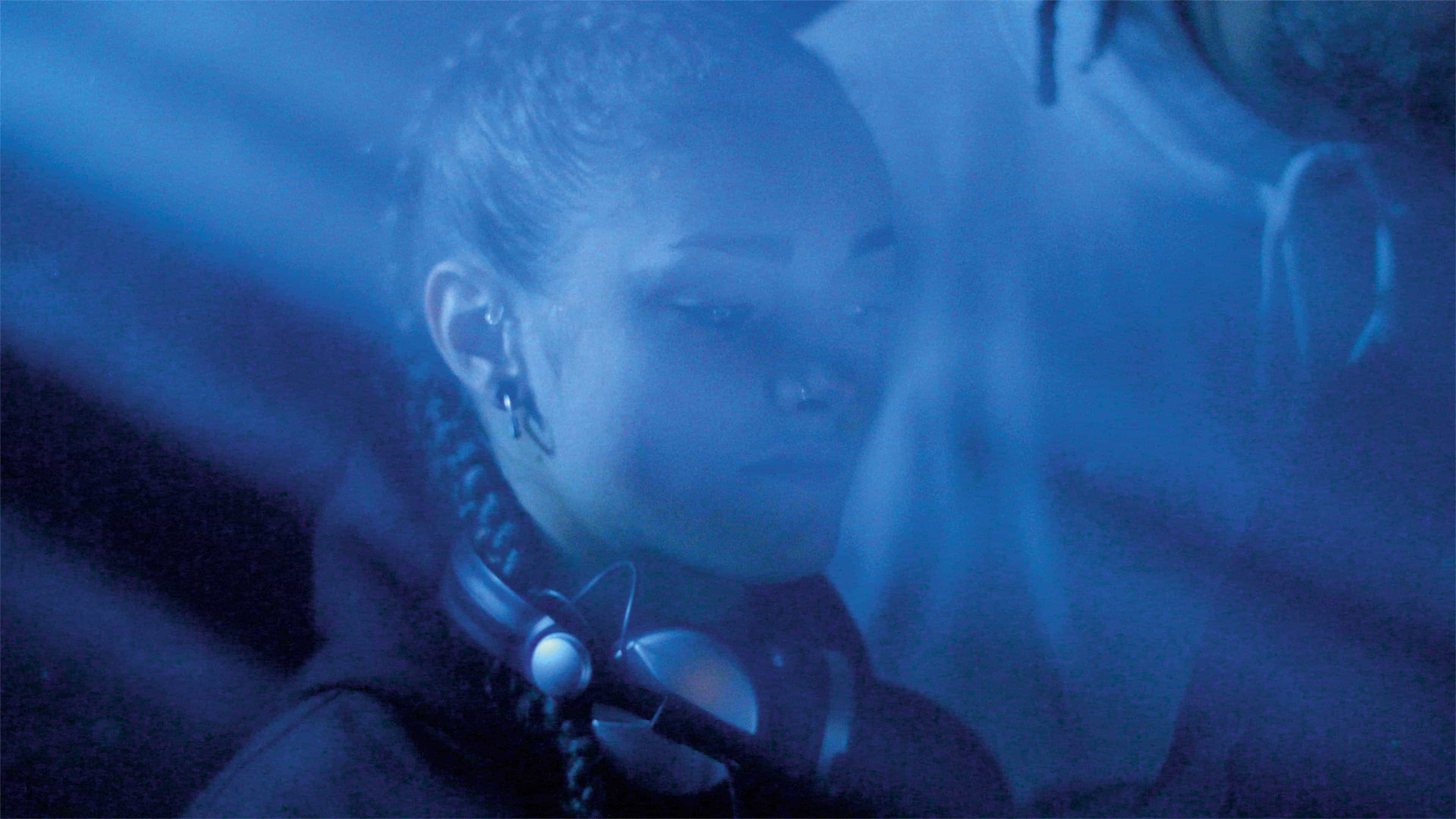
Youri Kravtchenko So, I hope you enjoyed it. Matthieu, I think this is not the first time you get this question, I know that you get it a lot. Rose, in the film, is an incredibly endearing character. Who is she, and what happened to her?
Matthieu Bareyre She is becoming who she is. And we are starting to work together on a fiction film inspired by her life.
Youri Kravtchenko A fiction film, okay. Matthieu, do you feel like you filmed a French night? Do you think it could be the context of the film? That's what it feels like. I am also aware that we find ourselves in the context of Lausanne. And I asked myself this question during the film: Is it a film that could have been shot in a Swiss context? Obviously, you have just arrived here, and the question arises because we have a specific moment in a particular story. My question is, are you filming Parisian nights?
Matthieu Bareyre During the film, I ran into a gentleman who left before the end of the screening, who told me that what I showed was extreme, and subsequently we talked about it with some students from the school. And there was a Parisian living in Geneva, who had lived through some of those moments, those years, 2015, 2016, 2017. She said that, yes, it had been hyper exacerbated, and since she has lived in Geneva, she thinks it's a lot calmer.
Finally, I am not aware of it because I am not someone who likes to travel a lot. I want to film what's around me. What I think I know about. I try to look around where I am.
I guess, well, I don’t know to what extent it's clear when I show the film in Cairo, or wherever. People do not necessarily tell me, that's really France. They are somewhat surprised that this is France. They are surprised by two things: that Paris looks like that, it's not at all like the postcards we have in mind, and then they are surprised to recognise themselves in the movie’s protagonists and what they are expressing.
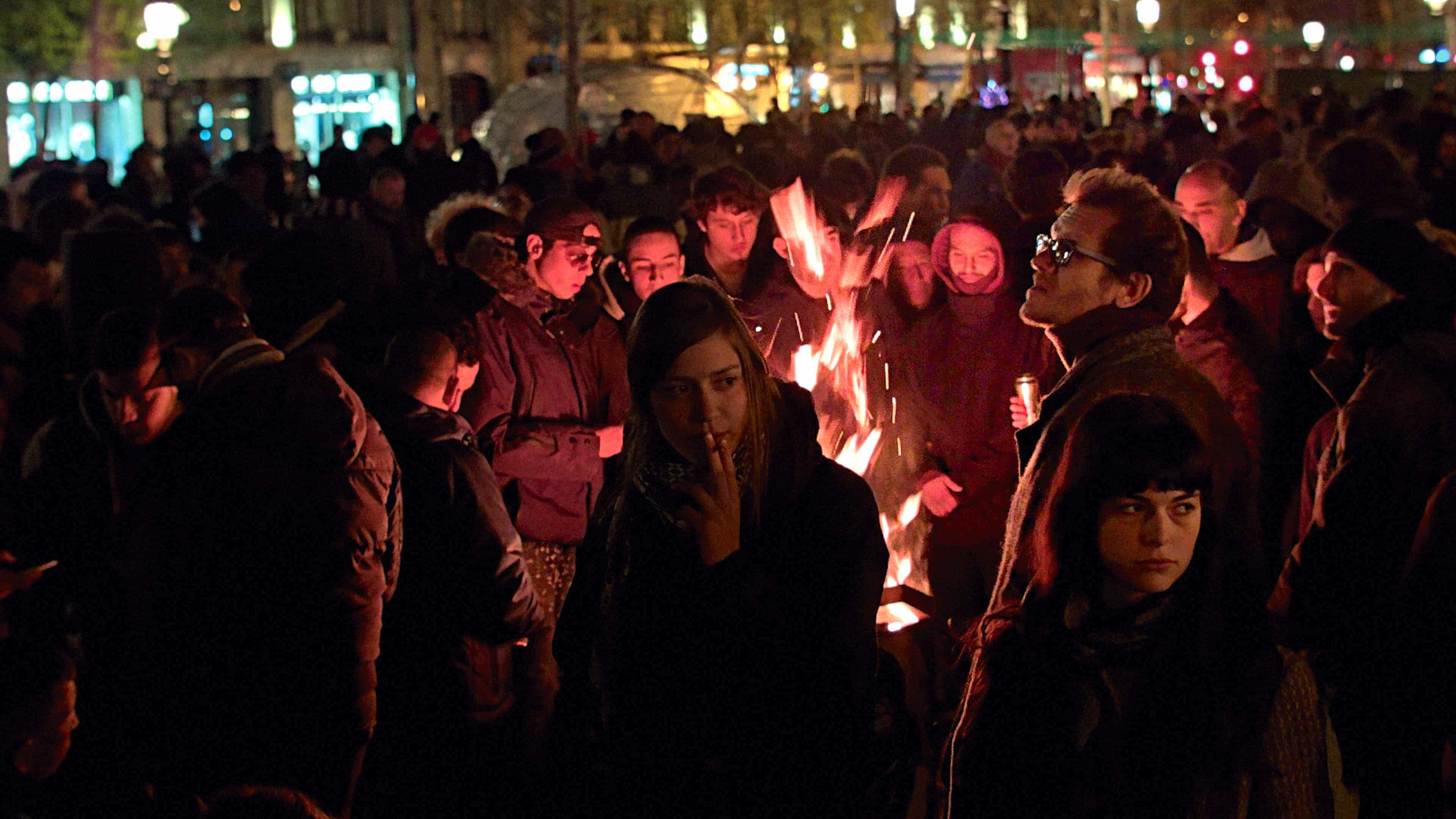
Youri Kravtchenko I have other questions, but the public may have some too? It would be interesting to have their views.
Public question 1 Yes, it's a pretty technical question. Thank you for the film, it's a very good film, I really enjoyed it. But I have a question that I asked myself during the whole movie. We saw some speakers give their names, so we see them at the end. What was the process, were they all asked, ‘Do you agree to appear in the movie?’ And an ancillary question: Was there anyone who came back once the film was aired saying ‘Ah it's not going at all how I thought it would, and I don't want to be shown like this’?
Matthieu Bareyre It's funny because this concern with the editing, or the right to show, is really something from our times. The movie we were watching just before, Night-time, right? When we watched that film, I said to myself, it's incredible that, at that moment in history, the fifties, this movie was made.
I think everything was filmed without the awareness of the people in it. Yeah, they were shooting on the streets, and image rights did not exist yet. What is staggering today is the awareness that people have of it because they are so afraid that they will be betrayed, that one will destroy, mistreat their image. They are very cautious about that.
This is noticeable after the screenings because I am asked the question before, i.e. at the time of filming. I mean there were people I was not filming, who were not at all in my frame, who came to me and said, ‘Hey don’t shoot me, you don't have the right’, whereas I had not planned to film them. In any case, this is very acute today because people, as soon as they see cameras, they think that it is the television, that it is there to steal something from them. Well, I don’t believe that's the way I work. In fact, the people in the film, the characters, I met at random, on the street, at demonstrations, in clubs. Like here, I met Nicolas, who introduced me to Solène, who introduced me to so on, and that’s how it went. I had a challenge, which was to make a film that was not just my take on whatever, not an auteur film, the gaze of someone on something. What I was interested in was that it would be a film about the people I met, not just those who are in the film but also those I met and filmed without thinking of putting them in the final edit.
Often what happened was that, after a shoot, after meeting a particular person or sometimes after several months, I asked them, I explained to them what I really wanted, that I wanted to film them and maybe wanted to keep them in the final edit. It seemed essential to say to them, ‘If I want to be able to keep you in editing, sign something’.
So, the question is, when do we talk about it? Since I never spoke about it at first because it breaks the relationship when we start off talking about contracts or no contracts. Well, I often talked about it at the end of the evening, or at the end of the time I spent with them. But what is important is that it's not a question of taking, because at that moment people, well, how to say, we are together. It's not that hard to film people once you get their trust because you meet them and something is happening between you. What is harder is after, because when it’s the evening, we are in a particular state, we are entirely in it. The question is: Will you be able to live with this image one month, two months, two years later? So, not very often, but it has happened, I sent them the rushes, but it depended on what stage of production I was at.
But of course as soon as I felt that there were people who interested me, I took pictures. They had already signed an authorisation either at the end of the evening or at some point. Either I wrote to them, or I sent them rushes. I sent them screenshots. And then, when I was editing, I sent them their segment. Sometimes, I even sent them the film because it was vital for me that they could come along to the projections to appropriate, to claim this film: ‘Yes, maybe I've changed, but at that moment, it seems to be in line with the idea that I had of life or myself’.
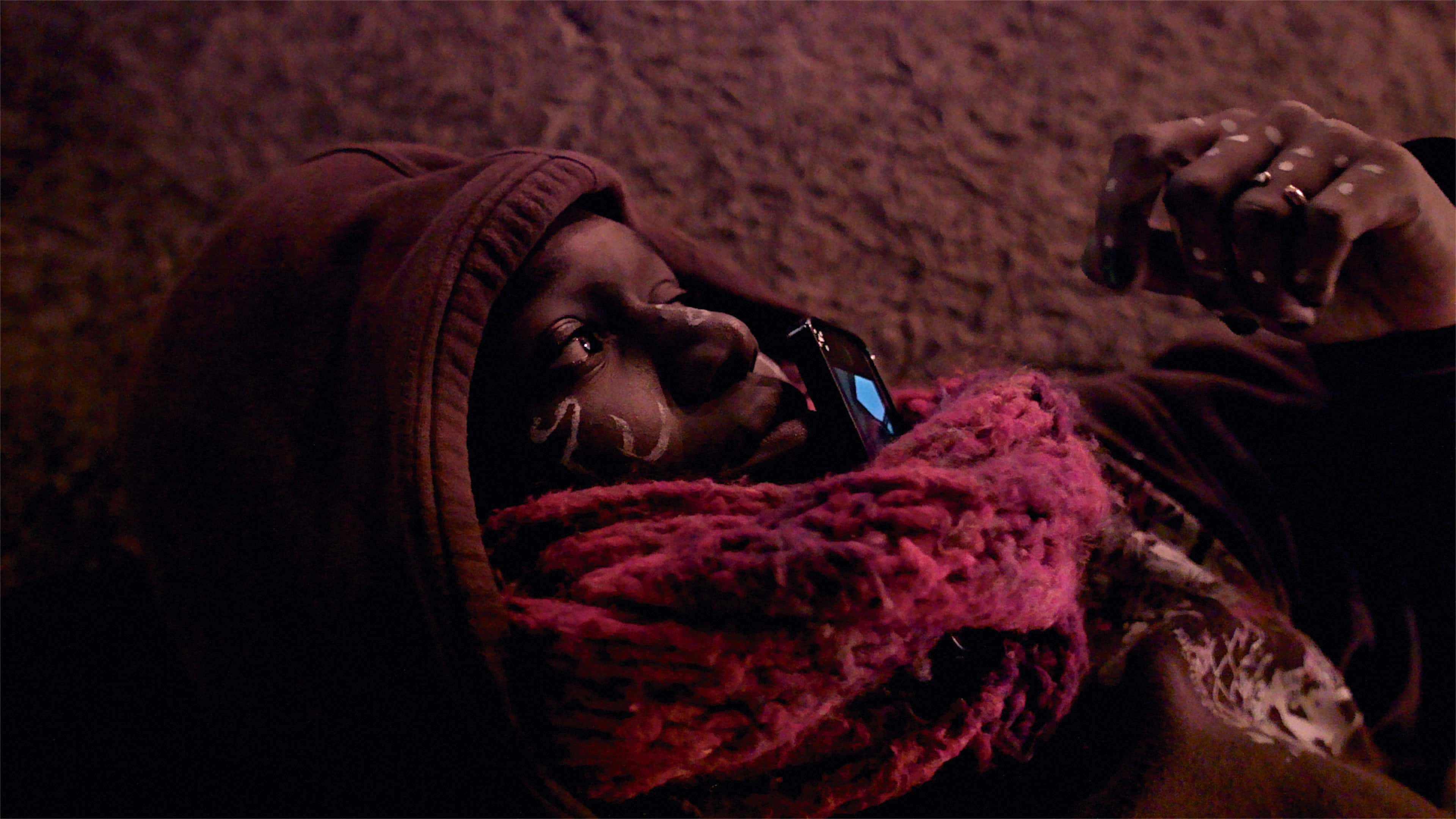
Youri Kravtchenko Was the idea of filming the night there from the beginning?
Matthieu Bareyre Yes, yes, very quickly, as we said at the beginning. I initially thought of a short film called Nocturne, which also took place at night. Finally, nothing to do with that, it is about a group of young people that I followed for two years, who are sort of addicted to games, horse racing in P. De Vincennes. I was not at all an insomniac or night owl.
I never really liked the night. I never inhabited the night. I've never been one to walk around at night. I think I'm interested in freedom, and the night is the moment we feel the freest. There is a liberation of bodies, where language and things become possible, where we escape a little from who we are during the day, where we come from, where we are supposed to go, what we are supposed to be because we have a function, a status, or whatever.
What interests me is when you venture into areas of life that, in fact, you don’t know, and that you didn't voluntarily choose to avoid. Well, it's things like that. So, a kind of territory of the involuntary, the uncontrolled, the unconscious. These are the things that interest me. From dreams to nightmares.
What I mean is that there are moments when things escape us. Nightmares and dreams are precisely that, that which is part of us. It scares us, fascinates us, attracts us irresistibly, and at the same time, we cannot really claim it because it brings out things that go against what we believe about ourselves, conventions, morality, and what is expected of us. It makes it jump out. And when one is interested in everything, I think that inevitably it will be during the night that it must happen. I remember during the shoot, well I worked a lot like that, by writing things that I found all over the place, phrases, tricks that guided me. And I found a sentence, it was a kind of novice verb, ‘infinite eyes that the night opened in us’. And I thought, well, if the film is not called L'Époque, it could be called that, the infinite eyes or whatever. There was something there.
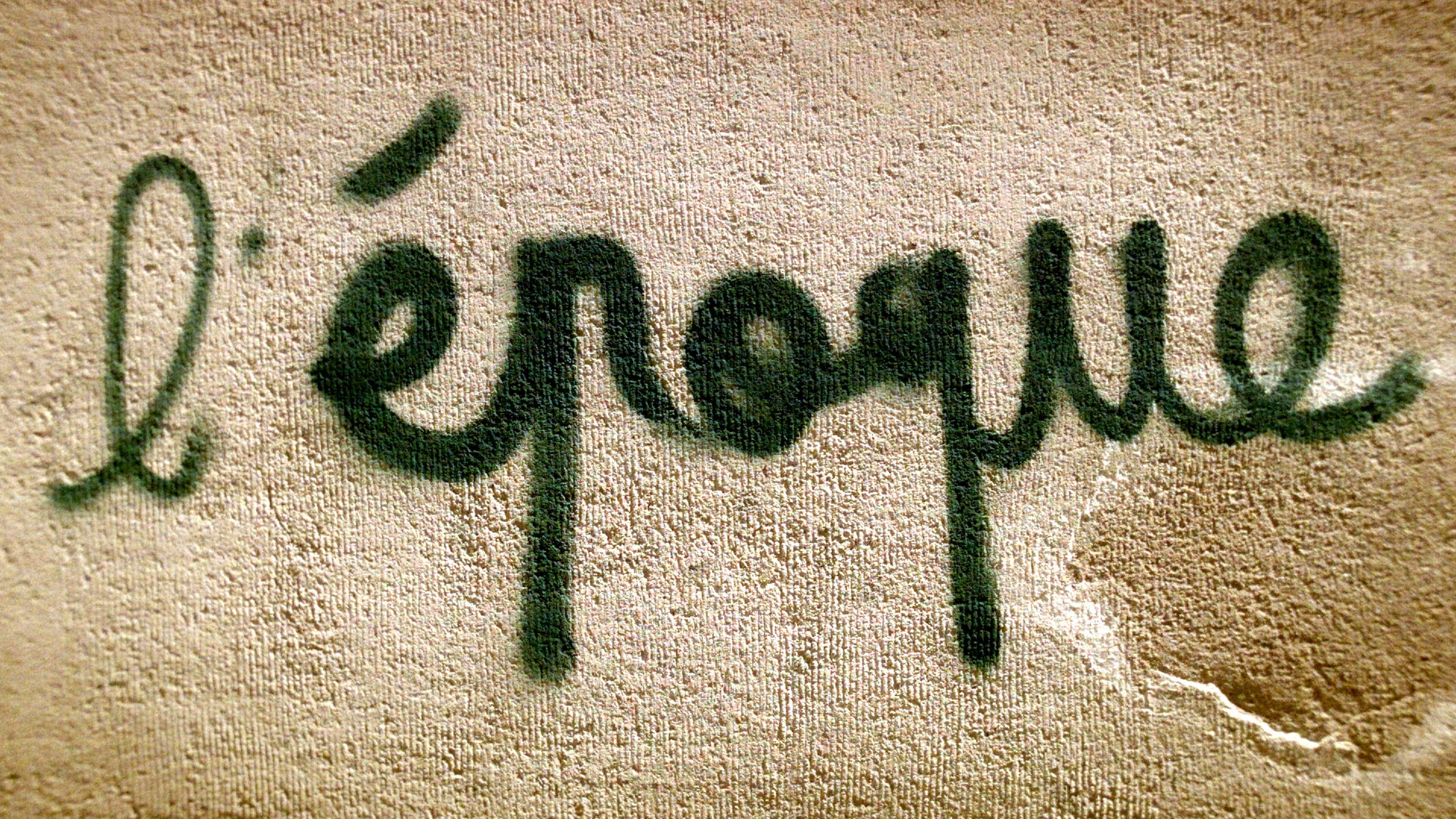
Youri Kravtchenko Your daily life during the filming process, we talked about it a little bit at the very beginning, just before screening the film. You lived this nocturnal experience for two years. Could you first explain to us how your weeks were punctuated more or less? And how did it affect your daily life?
Matthieu Bareyre I think there was, yes, indeed there was a kind of rhythm. To begin with, we often filmed on the weekend. We shot Thursday, Friday, Saturday, the times when we were most likely to meet people and especially when they were willing.
In fact, what I remember is that I spent a lot of time preparing for the shoots because of technical issues. It is true that it still requires a kind of, not asceticism, but, how to say, I think that the key is to make the technique not a type of instrument separate from us but something we're used to. That's why, even when I was not shooting, I had the camera in focus, I still had the camera. But also, I did not want to be, ‘He's the guy with the camera’. Because in real life, things are clear. And then, I think the rest of the week, I tried to adjust again, I tried to find a balance that was broken again every weekend. Because we really had to film Soral, the DJ. We were well aware that it would end very late and it would make me miserable. I was finishing at eight or nine am. For me, it's really the end of the world. But for her, she continues until 2, 3, 4, 5 pm, as says M., the guy in the film who talks about drugs at one point.
For me, it was very violent, physically, and physiologically. It was like, yeah, as I said at the beginning, it felt like I was always exhausted and unwell because it was not at all natural for me.
Also, I spent a lot of time chatting with the people I had just met. There were people I met, and sometimes I saw them again in the week, and I had a coffee with them or talked with them. I found them on Facebook, I explained the film to them, etc., etc. Or I tried to understand where they would go on the weekend. And especially with Thibault Dufay, the sound engineer, we were always wondering, ‘Where will L'Époque go?’, in fact. That is, what is important? Which one among the countless event options will it be?
Because, obviously, making a film like that, we are navigating in a sort of crossover with current events. The reality is that the news is an assemblage of information or events that we are sold and asked to consider as a priority. It has a lot of power, it's duplicated everywhere, it's imposed everywhere. So, it's hard to find our relationship with that. To be able to find the distance while still being sensitised. Find enough distance to be able to make our choices. That was it, and it took a lot of time.
I remember I think I often spent the rest of the week talking with Thibault Dufet, the sound engineer, Sophia Colet, my co-author, and Marion Siéfert, artistic collaborator. We always talked about: What should we do? Where should we go? Who should we see, and how? How should we film? What is the right distance for a close-up? Things that may seem technical or something. In any case, in my view, they are fundamental when you make cinema. Effectively, what lens I would bring, because I was working with fixed-focus lenses. It's a bit crazy because I wanted this specific camera. And the problem is that with this camera, I did not have much range of brightness. I could not shoot too much in this range of sensitivity, going too high. As a result, I found myself having to work with fixed-focus lenses because it’s night, and at night we need light when we don’t have any. So, we opened the diaphragm completely, to 1.4, 1.8. As a result, I could not have a zoom because zooms don’t open as much, they open to 2.8 max. And 2.8 is already too dark for me. So, I had four focal lengths with me while shooting, corresponding to the classic photo lengths. Basically, I had a 35, a 50, an 85, and sometimes a 120. I had them on me, but you need to have enough reflexes, an eye. For example, Mehdi, in the Place de la République, the young person who says, ‘If we notice, well, time is false, it is unreal. We are waiting for something, but what are we waiting for?’. I don’t know if you remember. He also speaks about his dream of feeling helpless. He was a guy who was very tall, very massive. He was a boxer, I remember, anyways, that was very impressive.
So, if I film it as I film, for example, I don’t know, Arthur, on the docks, talking about his parents or his desires, business school, etc. I film him in a portrait style. It is the classic style, very harmonious, very respectful of the dimensions of a face, etc. We will not feel his presence. So, at that moment, I must gauge the person I have in front of me. Here what I need is a wide-angle so we can feel him in the frame, to feel his weight.
And things like that take very long to acquire. I have not done film school myself, so it's also a kind of film school for me. It's four years, not four years but two years of intense, permanent filming where I shot all the time. And in fact, it's also a way of doing my cap as they say.

Youri Kravtchenko Yes, Matthieu explained to me that – I don’t know if you’ll allow me to say it – but that he studied philosophy for a little while, four years?
Matthieu Bareyre I did not want you to say it, but voilà.
Youri Kravtchenko It's done, voilà, I will not say where. In any case, it's impressive. I don’t know if you have any other questions.
Public Question 2 Good evening, thank you very much for the film, it was super interesting. There has been a lot of conversation around speech, and my question is, how did you decide who gets to speak? And for example, we often see the CRS, the police, and they don’t have a voice, for example. There are characters who don’t speak and who are present throughout the film. So, I wondered how this decision was made. How did the editing process work, and how did you limit how many people got to speak?
Matthieu Bareyre There are several questions in this question. So, regarding the police, I never went looking for someone at night because they had this or that function. The people I met, I don’t even know what they were doing in life, and I didn’t care. I would never have gone to a policeman to ask him whatever because he was a policeman.
If I had met a policeman with his friends on a night out, I would have been interested. As long as he would tell me about it spontaneously.
So already they cannot speak, they have the right not to speak. To go a little further, in fact the underlying question is: Is the police the counterweight to the youth?
Public 2 No, it's just the theme of speech, which can be certain roles that they did not do, it's not cold. It's on a set of panoply. ??
Youri Kravtchenko That's a selection.
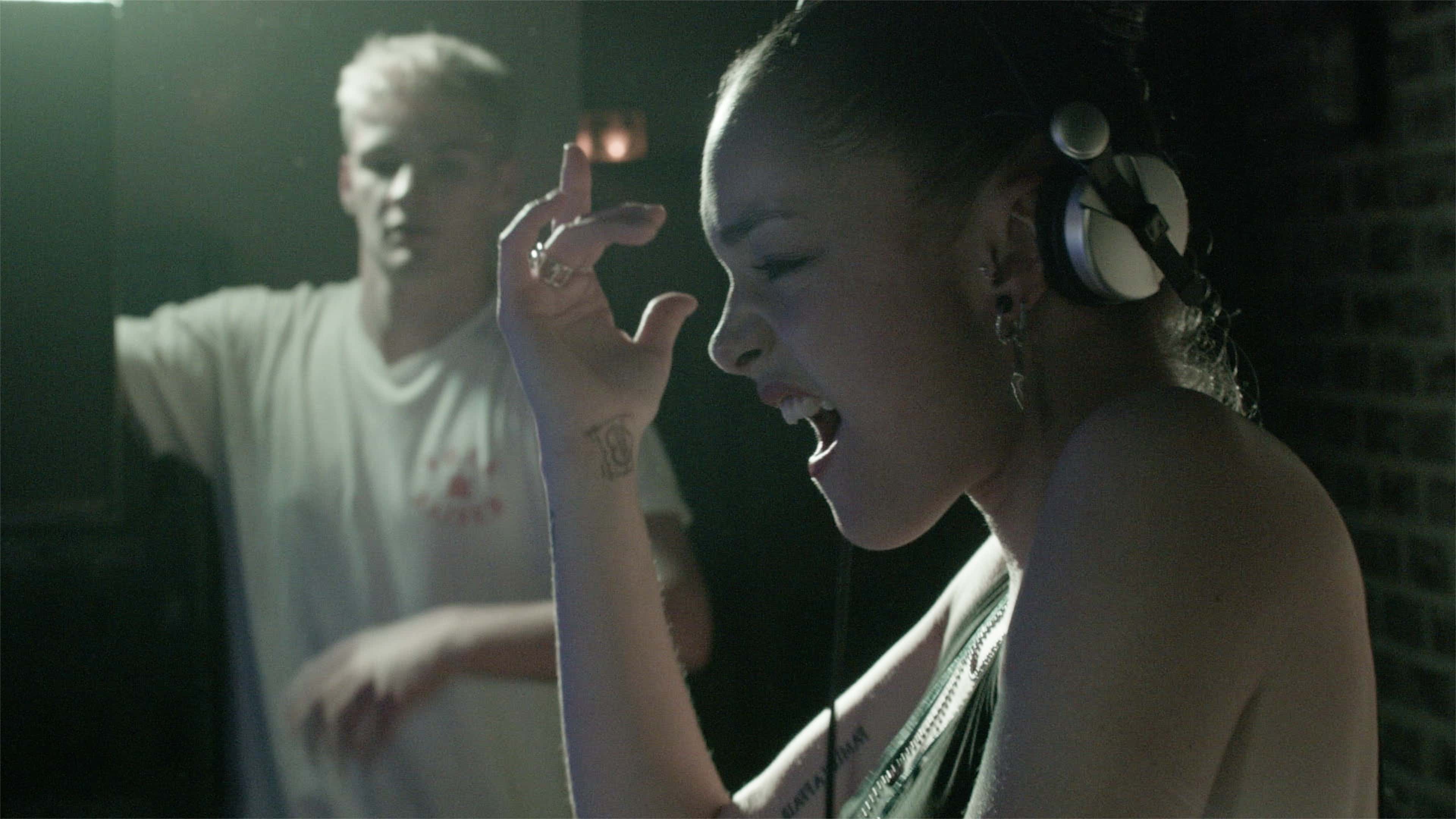
Matthieu Bareyre What interested me was people, people who are able to seize my presence. I wanted things, not necessarily words, events, at any time, that seemed, commented, not taking into consideration the presence of the camera, that is, to be precise.
For example, Arthur, on the docks, of whom I already spoke, told me, at the end of the rush, ‘It's weird to put words on it’. Sarah, on the terrace talking about loneliness, etc., I saw her every two weeks. She said to me: ‘To do what I did, that was crazy, that's what I already told my parents, I never told my friends, I never told anyone in fact’. But that is to say, I was not looking for speech or opinions. I was not trying to get people to find truth about this or that topic.
I just wanted there to be, at some point, an expression that seemed to break with habits of the unsaid, silences. That's what I was looking for.
It was speech that was bursting out. And why? Because it was him, because it was me, because of the camera, that's it. That's why it came out like this. In fact, I gather something that happens for the first time before my eyes and the eye of the camera.
Youri Kravtchenko I have one more question. We are talking about you filming a lot in the past two years. I would like to have your day-to-day and your point of view on editing. Did you do it alone? Did you have to go back to it several times? I imagine that the way it is assembled necessarily generates different messages. When the music comes in it is extremely subtle. So are the moments of silence. How did you get to the final edit?
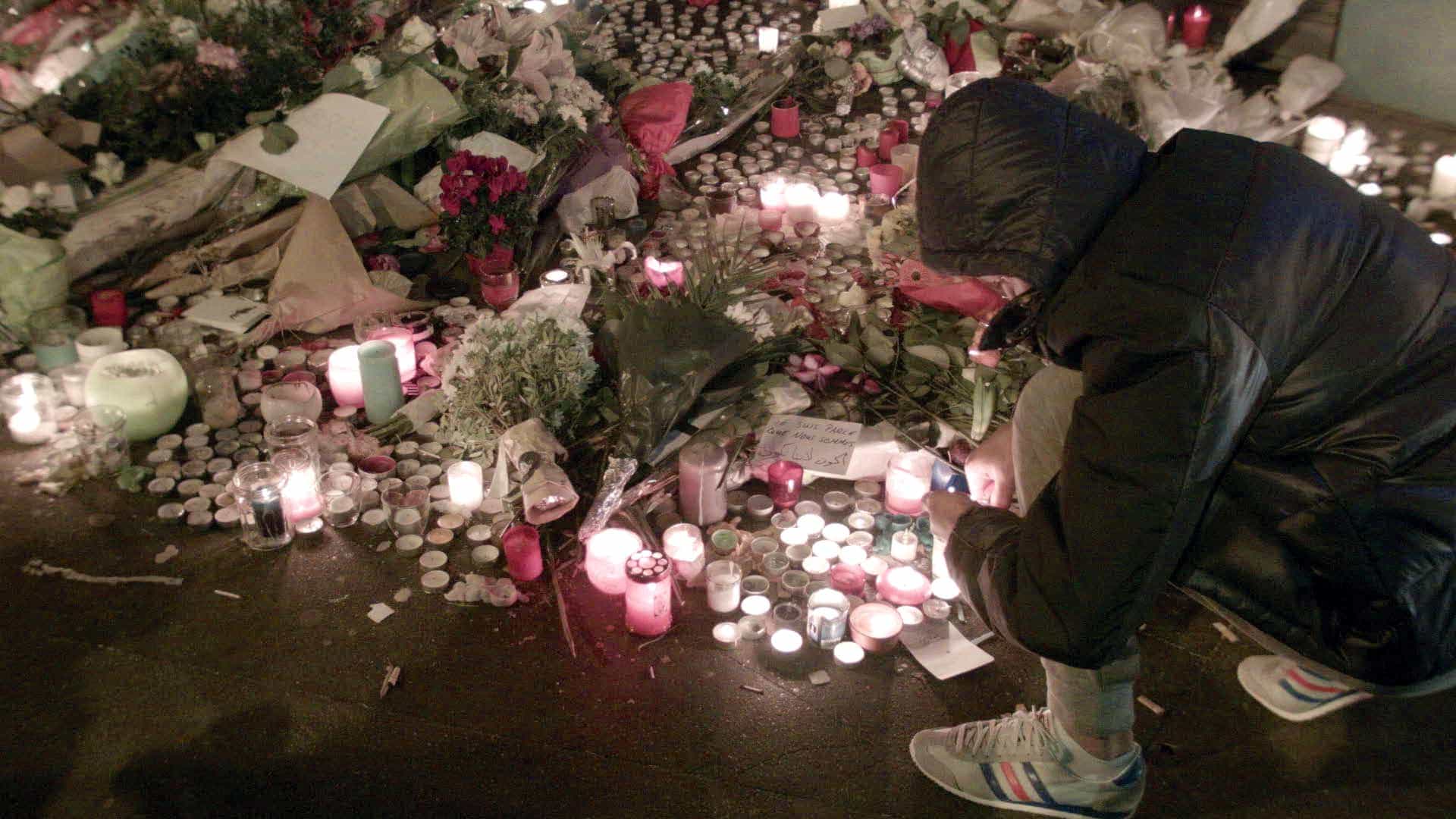
Matthieu Bareyre So the editing, in terms of, how do I say, the timeline of the editing is not... I started digging while I was still shooting. I began the process of de-rushing with Sophia Colet, my co-author, in September 2016. For three months, we narrowed down non-stop. Everything we had filmed between May 2015 and, let's say, June 2016. So, for three months, we looked at everything. We looked at everything and started to make the selections with Sophia. Because obviously, de-rushing is one thing, but then the important thing is how do we classify the rushes, from what angle, under what themes?
Night, no. What kind of dialogue? Themes, why not. Places, why not. Oppositions, why not. I don’t know about nature, the light, the darkness, how things like that work. These are things that I have tried for months. How to give order to all this? Then I went into a very intense filming period, but at the same time, I continued to do editing research. I thought about editing all the time, even while shooting, in 2015 as well. I was obsessed with it. I think at the beginning we had a film in mind that was about connection. To bring closer, how can I say it, excuse me it is a little far-fetched. I think that, at the very beginning, the project of the film was to delineate connections, passages, bridges, jumps between things, areas of our lives, of our lives when we are 18, 25 years old. When we individuate. On the one hand, there is family, the weekend, the week, work, the relation to politics. In fact, we keep a lot of things separate.
In fact, what interested me was to show that it was all linked. That there is no distinction between what intimacy is, the romantic, for example, and what the political context is in which we are. For me, what interests me is that all this communicates. So, the project of the film was a project of assembly. It was finding these connections. What took us a very long time was to see the link between each image, from image to image. To find similarities between the pictures, patterns, motives that would take us from one person to the next.
For example, the only thing that remains from this stage of the film is the moment when I think I am connecting with Sarah, who is in Oberkampf, who talks about her teachers in Sciences Po. Sandra holds the camera at that moment and says to her: ‘And you are down there to escape?’, ‘Yeah, to survive’. She makes a gesture of a plane using her arms. And just after, I picked up Sophiane on the Champs Elysees, who is running and making the same gestures with her arms. That was what we had in mind, find the differences, distinctions. Lives that are made up of different arches of youth. Find pathways to try to get closer. To show that people are less frontal, superficial. Finally, we let go of all of that gradually. We broke away from it. Because it would be too much to require the viewer to perceive the idea we had. It took me some time to recognise an obvious thing, which is that it's up to the viewer to make his own connections. And so it's not necessary to edit terms on terms but rather to create distance.
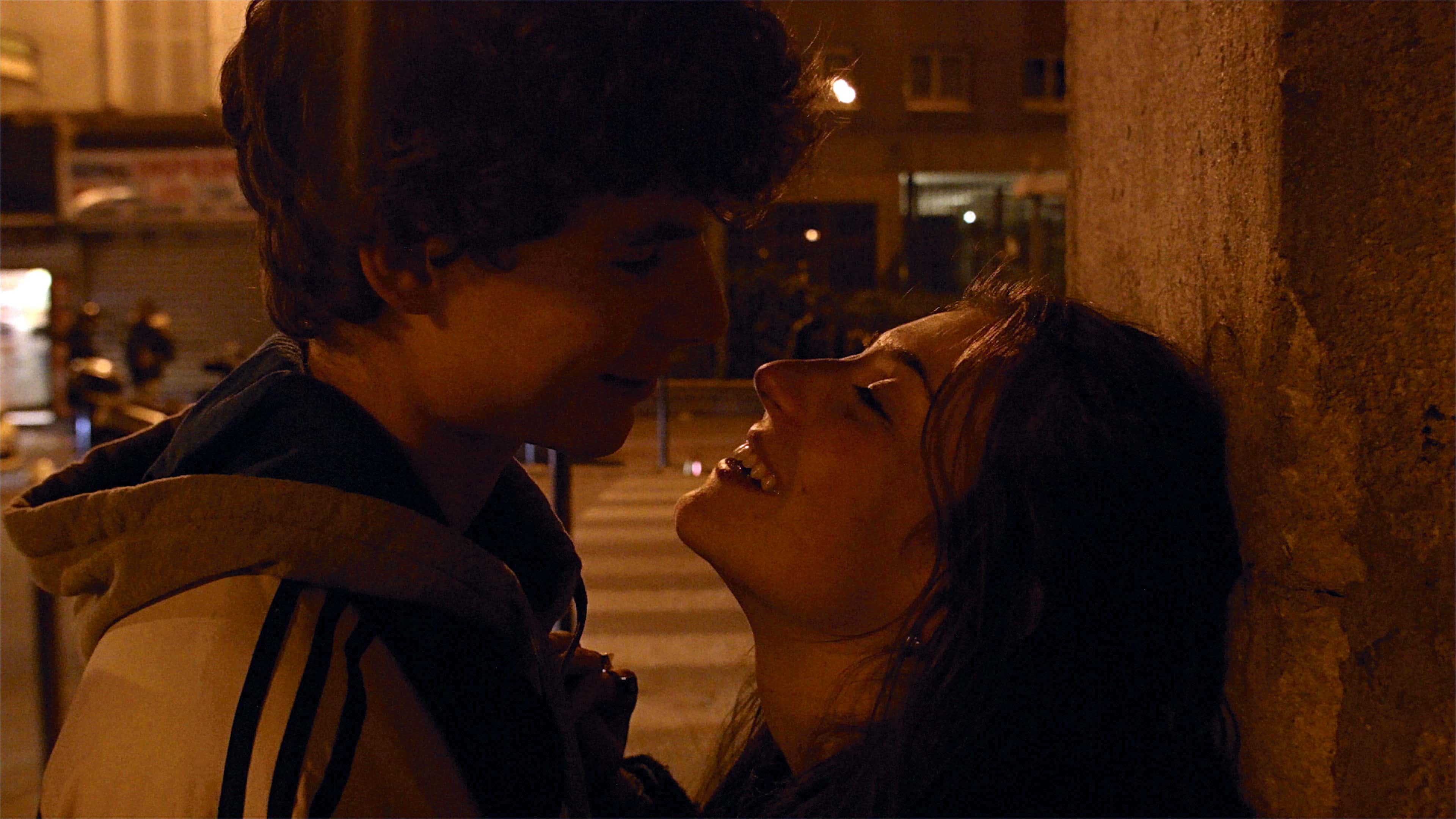
So, I would say it's a film about correspondence rather than mirroring. Well, there is also something, I was very touched by Jean-Luc Godard's Goodbye to Language, which I went to see three times at the cinema in 2014 when it came out. I don’t know if you've seen it, but it's a very dense film that I found dazzling and that inspired me for many different reasons. Technically, because Godard was very fascinated by everything camera, coming out of small cameras. And I like this technophile side.
And then there was this kind of density to connect the images. Godard does it in a very artistic way, with great independence from what he shows. So that's really a very powerful authoring gesture, but in fact, I realised that what I wanted was that somehow the audience would feel what I had felt being around these people. So, it still needed to be much less fragmented, and it would benefit from having a sequenced approach. So, back to the editing project, which I enjoyed too. I got a taste for the rough cut. I wanted a very bumpy movie. I didn’t want to do some kind of artistic film like Godard.
I've been listening to rap since I was a kid. In Godard, there is this mixer side. Great mix, pictures and sounds. I liked it a lot, so I went spontaneously to that, and then I realised that it was not possible, that it was necessary to let things unfold a little longer so that each person could exist in all their autonomy. So that we don’t have the desire to compare people. The editing is not only there to compare but also to organise their independence, their singularity in fact.
There is also something in terms of editing, I finally started once I finished filming in June 2017. I threw myself without transition into editing and did it for months without stopping. For months until I crashed from exhaustion. I remember calling a friend, Laurie Lassalle, a filmmaker, and I said, ‘Damn it, I cannot do it anymore.’ I also had a lot of pressure from the outside, production, distribution, etc. I needed to breathe, I needed someone to protect the film. And even to protect myself because I think, after a while, I had been tense for more than two and a half years. At one point, I thought I must be more confident. I trust myself because I know why I want to save and protect it, but at the same time, I had no more strength.
So I called Laurie, and I asked her, ‘Do not you know anyone?’. And at the beginning, talking with her, I said, 'Ah, I'm going to contact the editor who worked on Rabah Ameur-Zaïmeche’s films, like Bled Number One, Wesh Wesh, What's Happening?, Dernier Maquis. They are great movies. Frankly, if you don’t know them, they’re extraordinary. Wesh Wesh and Last Maquis are among the greatest films of the 2000s.
The editor was Nicolas Bancilhon. He came to my house, and I showed him a montage version that lasted 2:45. The guy saw the thing, and he said, ‘Well, I see where you are going’. But at the time I was editing, he was I think 40, 45, he had two children, he was busy. He said, ‘I feel it's going to be all-consuming, and I'm not going to be able to do it all the way’.
That's when I called Laurie, and I said, ‘Fuck, I don’t know where to go’. And she said to me, ‘Ah, I just saw Carne Viva by Jean Charles Hue’.
I don’t know if you know Jean Charles Hue, he did Eat Your Bones, The Lord's Ride, also incredible movies. And Laurie had seen his first film, which was almost impossible to find, because of questions of rights, he could not release it. She said to me, ‘Frankly, I don’t know who edited the film, but the person who did it is who you need for L'Époque, she can bring it home’. I said, ‘Okay, good’. I did some research, especially watching Carne Viva and understanding the kind of editing that was done. Okay, I tell myself that I know why she said that to me. I find the contact info of the editor, who is a woman. I wrote to her in October 2017, October or November. She answers, and she says to me, ‘Well, let's have a drink.’ I see her again, and she says to me, ‘So, make it fun’. In the end she was the one to interview me. It's that simple.
I really wanted to show her the rushes of the final edit. And she said to me: ‘No, no, what I want to know is what you have in your stomach. Is this movie really your life, or is it just a movie?’ So, for two hours she talked to me, she asked me questions, etc. After two hours she said to me: ‘I think we’re good, we can go ahead.’ And so, she came to see a montage version. Then the movie ended, and she said, ‘Well, okay, let's go.’ Even before mentioning production or money or anything. And this was very important, of course, because it made me specify my relationship to the film, and put myself in the movie as well, to find my place in it, my presence off-screen. All these are questions that may be obvious, but we don’t necessarily think about them. I tended to put myself entirely aside, to erase myself.
Besides my first night film, it's a film from which I'm missing, and people tell me that: ‘It's scary. It seems like stolen images. It feels like you're not there, like there was nobody. That the images were filmed by a camera that was running on its own’.
And then we worked on the editing for months, and it was still very, very hard, very intense. But there was this kind of constant dialogue, even if Isabelle is not the person, how do I say it, she's unpredictable. But I knew it was at least two of us crazy people behind the controls. I was no longer alone.
Youri Kravtchenko I have just one more question. I noticed a detail, the lack of domestic spaces. The absence of interior spaces. Of course, there are nightclubs, maybe I'm wrong, maybe I forgot some. Was it a choice, or is it merely that, in the end, your playground is the outdoor space? Suddenly, because we really have this powerful impression in the film that the characters evolve individually but also a sense of erased intimacy. They evolve and live in the vast terrain that is the city.
Matthieu Bareyre Yeah, clearly, it was in the concept of the film from the beginning. That is to say, I think that Charlie was important, January 7, 2015, the Charlie Hebdo attack. People at night gather at the Place de la République. I was there, it was a beautiful gathering. A gathering of mourning, a sort of silent gathering.
So that's something, to see this public space in Paris, which is so ravaged by trade and commercial industrialisation. Suddenly, there was a feeling that people were coming together who were feeling the same emotion, at least for something in common. I felt a kind of re-appropriation of the space that before was just functional. It was evening, it was a night gathering.
After the 11th, there was the big parade with Sarkozy, Holland, Netanyahu. A kind of political instrumentalization of collective emotion.
I thought there was a very “national unity” aspect after Charlie. I told myself it's not possible, in fact. It's impossible, the splits will reappear. The divisions will appear even more violently. It's in the movie, it's there. In fact, people will need to express themselves.
A while ago someone was talking to me about a book by Emmanuel Tod that I have not read, but in any case, we talked about it. I know Tod a little. I don’t know if you know Emmanuel Tod, a high-profile demographer who is quite interesting. He talked about Charlie as a totalitarian moment.
Personally, that's precisely what I felt. That is to say, there is more than one emotion that must be handled. There is more than one speech that can be held, and those who don’t own this speech are indexed. I just said, it's not possible, it will have to overlap. The breaches will reopen, the splits will reappear. This thing, this call, reiterated by all the institutions, the norms, of how to say, of the union. I told myself that it was going to burst out and that it is in this context that I want to make the film. That is, to wait for people to speak. That freedom of expression really reappears.
Youri Kravtchenko Therefore, you need the night and public spaces. It's this soil that is fertile.
Matthieu Bareyre What interested me was precisely to go for intimate things that are not mentally reserved for the domestic space or private space; to find this in a space, in a place, in a time that is supposed to be the reign of superficiality, of illusion. There was a kind of paradox that seemed interesting, and I decided to make the film from inside this paradox.
Youri Kravtchenko Matthieu, thank you very much for coming. I don’t know if there are any other questions or remarks. It's really a film of great accuracy and great subtlety, and from my point of view, it conveys hope.
Matthieu Bareyre is a director and documentary film critic. He made his first film, a medium-length film entitled Nocturnes, in 2016. From 2015 to 2018 Bareyre filmed young people in the streets at night and collected their stories. “There is Paris after the Charlie Hebdo events, its order and spirit. There are young people at night. I wonder what keeps them awake.” In this film, he explained his particular interest in night-time, saying: “During the day, people are stuck in their jobs, their daily routine. Encounters are rare. Whereas at night, you can say whatever you want. You choose the mask you want to wear. I walked around Paris for a long time before coming across the characters in my film. They had to be sincere.”

